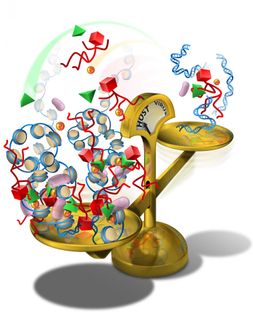Genome Damage Tolerance Extends Lifespan
Advertisement
The team of scientists led by Prof. Dr. Björn Schumacher at CECAD Cluster of Excellence at the University of Cologne has shown that a longevity assurance program in nematodes increases tolerance to genome damage. DNA damage accumulates with age and results in an aging-associated decrease in tissue function. Defects in DNA repair mechanisms can therefore lead to premature aging and early death of affected patients. The Cologne scientists’ findings open up new perspectives for the treatment of aging-associated diseases.
The genome in every cell is constantly under physical and chemical attack. These attacks can come from outside, such as UV radiation from sunlight, or from inside, like the toxic byproducts of our own metabolism. DNA damage can interfere already with developmental growth and the invariant gradual accumulation of DNA damage drives the aging process. People born with defects in the DNA repair systems suffer from retarded body growth and succumb to premature aging already during childhood.
How does the body respond when DNA damage cannot be repaired or accumulates with age? Prof. Dr. Björn Schumacher at the CECAD Research Center: “We investigated nematodes with exactly the same genetic defects in DNA repair as patients who suffer from growth retardation and premature aging. When the nematodes are unable to repair the damaged DNA, they activate a longevity assurance response.” The Cologne-based research team has published their results in Nature Cell Biology.
The longevity assurance program is executed by a worm protein with the name “DAF-16”. DAF-16 normally halts the growth of young animals when food is scarce. This allows larvae to survive for extended periods of starvation. Growth resumes when a food source is found, so offspring can be produced in the nutritious environment. Schumacher’s team has now shown that DAF-16 also responds to DNA damage, though - in contrast to the starvation program - it drives the young animals’ growth even when DNA damage persists. A second protein, EGL-27, instructs DAF-16 to promote instead of halt growth. In adult animals DAF-16 allows tissues to retain their function despite persisting DNA damage. The DAF-16 longevity assurance program thus increases tolerance to accumulating DNA defects. In older worms though, DAF-16 no longer responds to DNA damage. The older animals lose their tolerance to DNA damage and with it tissue function as well.
The Cologne scientists hope these results will open up new therapeutic approaches that exploit the natural longevity assurance program to prevent aging-associated diseases triggered by accumulating genome damage with age. Children with inborn genetic disorders who suffer from the effects of DNA defects at an early age could also profit from these therapies.























































